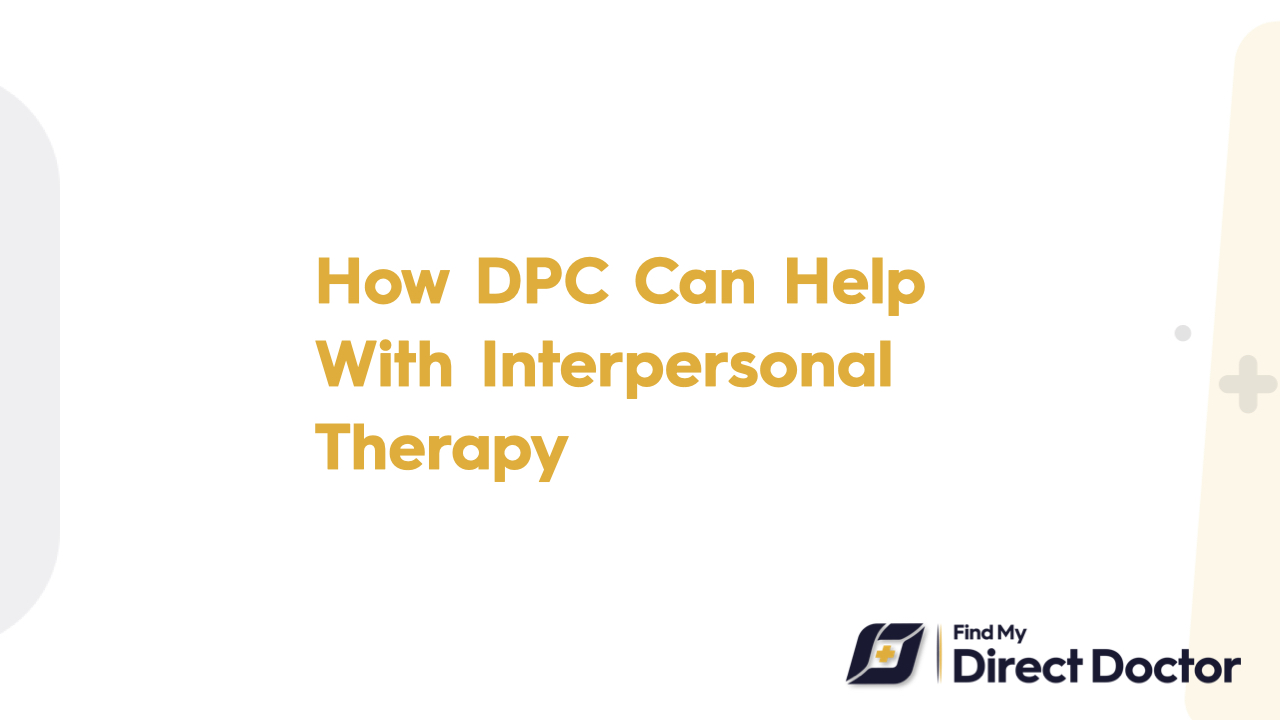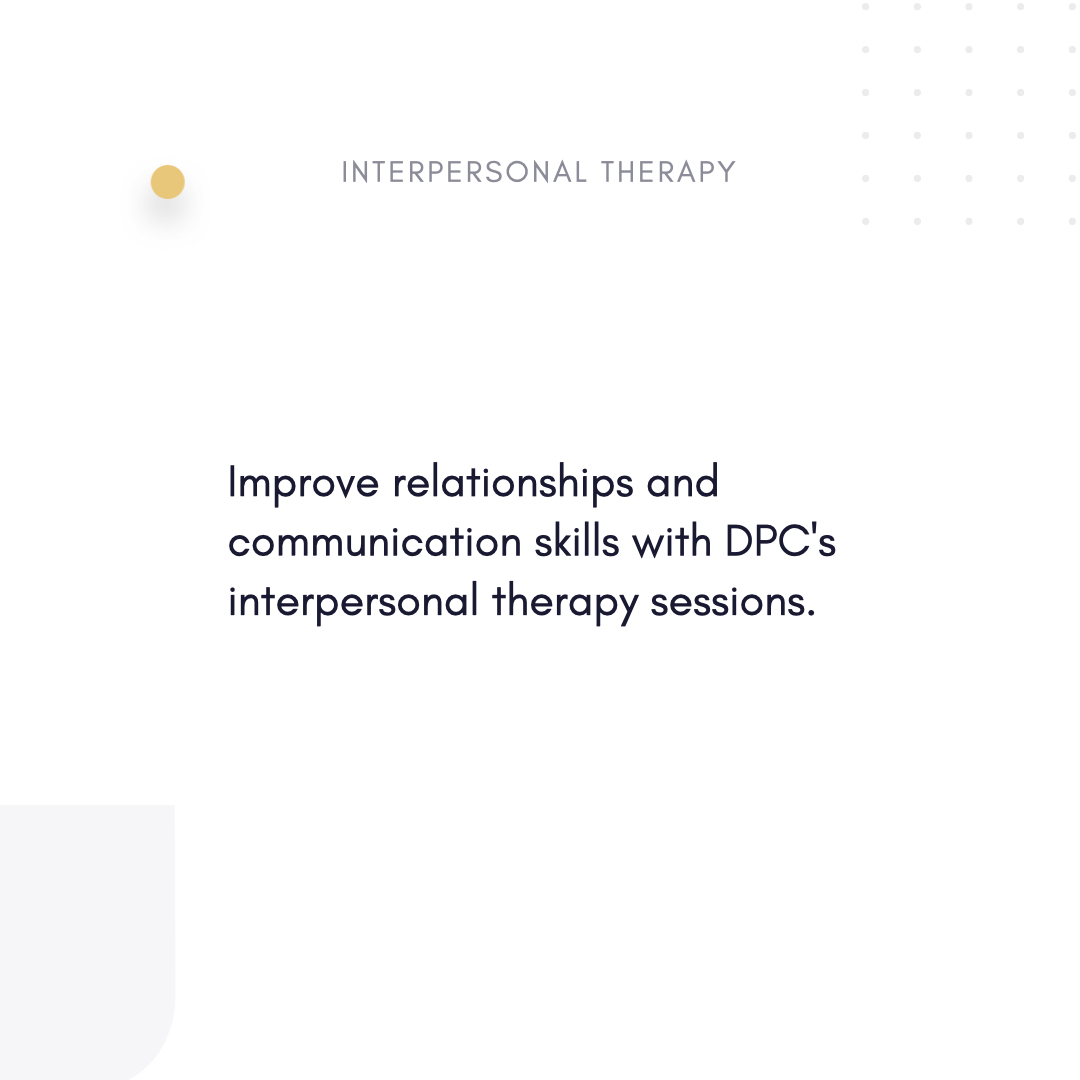Interpersonal Therapy (IPT) and Direct Primary Care (DPC): Healing Relationships, Personalized Support
Interpersonal Therapy (IPT) is a focused way to heal if your emotional problems are caused by strained relationships, grief, or changes in your life. Direct Primary Care (DPC) makes sure that this therapeutic journey fits in with all of your other care.

What is Interpersonal Therapy and How It Can Help You Fix Your Relationships
IPT is a short-term, evidence-based therapy that deals with:
- Disagreements about roles: Problems with family, friends, or coworkers.
- Role transitions: Getting used to changes in life, like getting a divorce or retiring.
- Grief: Dealing with the death of loved ones.
- Interpersonal deficits: being alone or having trouble making friends.
Usually done in 12 to 16 weekly sessions.
Important information for patients:
- Uses: Helps with anxiety, depression, and adjustment disorders.
- Safety: Doesn't hurt; no side effects from drugs.
- Costs: DPC members get therapy as part of their membership, while traditional IPT sessions cost between 100 USD and 200 USD.
Risks of not getting help:
- Long-term depression, broken relationships.
How DPC Improves IPT Results
Direct Primary Care (DPC) combines mental health and primary care by providing:
1. Easy access to therapy
- Same-week intake: You can start IPT right away, without having to wait.
- Integrated sessions: For your convenience, combine therapy with medical appointments.
- Telehealth options: virtual sessions for people who are busy or can't move around easily.
2. Customized Treatment and Comprehensive Care
- Individualized focus: Focus on certain IPT problem areas, like grief or changes in roles.
- Managing medications: If you need to, combine IPT with antidepressants.
- Integration into daily life: Suggest social events or support groups to practice skills.
3. Compassionate Continuity and Crisis Support:
- Available 24/7: Contact your provider when you're feeling bad.
- Tracking progress: Regular check-ins to change the goals of therapy.
- Family involvement: Bring family members to sessions to fix broken relationships.
Success Stories from Real Life
- Case 1: Emma, 28, who is going through a role change after having a baby. Emma's DPC provider used IPT to help her deal with being a mother, which cut her depression symptoms by 70%.
- Case 2: John, 55, is sad because his wife died. John's DPC team used IPT and grief counseling to help him make new friends.
IPT in DPC: Frequently Asked Questions
- Q: What makes IPT different from CBT?
- A: IPT is about relationships, while CBT is about how you think. DPC helps you find the best fit.
- Q: Is it possible to use insurance for IPT?
- A: DPC includes IPT in its membership fees, so you don't have to worry about insurance issues.
- Q: What if I need more than 16 sessions?
- A: DPC will continue treatment or switch to maintenance therapy as needed.
- Q: Are there sessions for couples?
- A: Yes. DPC includes couples therapy to help with role conflicts.
Why DPC is the best at integrating mental health
The American Psychological Association (APA) puts a lot of stress on integrated care. DPC gets things done by:
- Cutting down on wait times: 90% of people start IPT within a week, compared to 3 months or more in the past.
- Lessening stigma: Make mental health care a normal part of primary care visits.
- Getting rid of costs: By getting all of their care in one place, members save between 1,000 USD and 3,000 USD a year.
Final Thoughts
IPT in a DPC setting isn't just about talking; it's about changing your relationships and emotional health with structured, caring help. With DPC, you get a reliable partner who helps you deal with life's problems and makes sure that each session brings you closer to healing. No broken care or money problems—just personalized therapy that helps you do well in your relationships and in other areas of your life.






